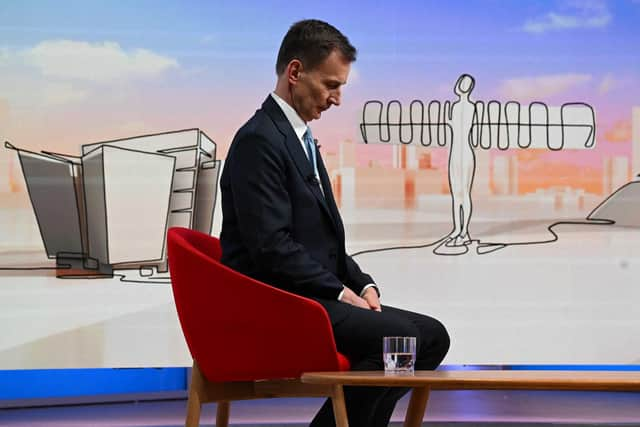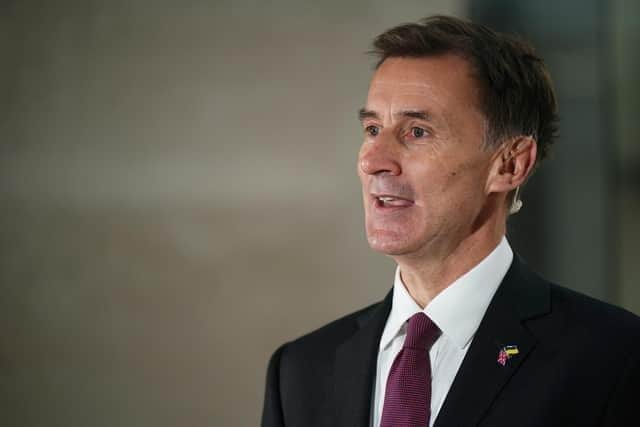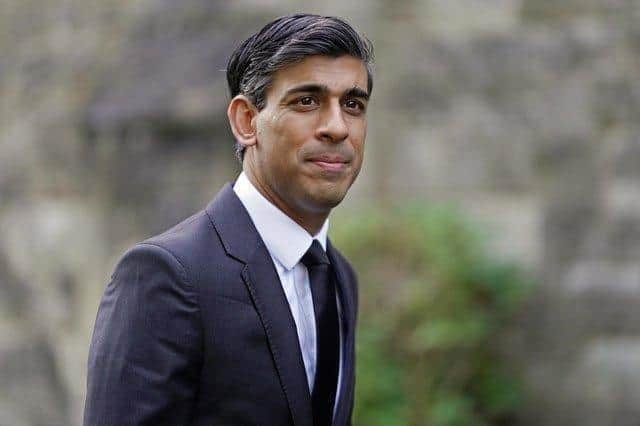Scotland’s Finance Secretary urges Chancellor not to cut taxes in Budget
Tax cuts are “unaffordable” and UK Chancellor Jeremy Hunt should instead prioritise investment in public services, Scotland’s Finance Secretary has said.
Shona Robison, who is also the deputy first minister, said she hoped for a change in direction when Mr Hunt delivers his Budget on Wednesday.
Advertisement
Hide AdAdvertisement
Hide AdIt came after Mr Hunt said during interviews with broadcasters on Sunday that he wants Britain to “move towards a lower tax economy”.


He said he feels a “moral duty to leave as much money in people’s pockets as possible” but any tax cuts will have to be “sustainable” and “affordable”.
On Friday, Prime Minister Rishi Sunak signalled the UK Government favours a further cut to National Insurance rather than income tax.
Mr Sunak, who was speaking to journalists at the Scottish Conservative conference in Aberdeen, said reducing National Insurance was “a union tax cut” that also benefited Scotland, where much of income tax is devolved.
Mr Hunt announced a 2p cut to National Insurance as part of last year’s Autumn Statement, reducing the main rate from 12 per cent to 10 per cent from the start of this year. A further cut of 1 per cent would cost £4.5 billion per year.


In Scotland, Ms Robison chose to hike income tax for higher earners in the Scottish Budget, which was voted through Holyrood last week.
She told BBC Scotland’s Sunday Show that along with bodies such as the International Monetary Fund and the Office for Budget Responsibility, she shares the view that the Budget “should prioritise investment in public services, not tax cuts”.
She said: “All of these organisations have said the same: that tax cuts are unaffordable and, indeed, it is the investment in public services that are needed. I agree with that and I really hope that Wednesday will see a change in the direction that Jeremy Hunt takes, particularly on investment on capital so we that we can invest in our infrastructure, things like affordable housing, for example, so those are the key priorities that I and many others are calling on Jeremy Hunt to prioritise.”
Advertisement
Hide AdAdvertisement
Hide AdShe also called for the £1.6 billion real-terms cut to the Scottish Government’s capital budget over the next five years to be reversed.


Elsewhere, Ms Robison defended the Scottish Government’s Budget following attacks from industry bodies and charities. Shelter Scotland’s Alison Watson said First Minister Humza Yousaf “has no credibility when it comes to child poverty” given the impact of his spending plans.
Ms Robison said the Budget had been “really challenging” because of a real-terms cut to the funding coming to Scotland and had involved “difficult choices”. She said her priority had been to protect frontline services.
Scottish Conservative finance spokeswoman Liz Smith said: “It’s ridiculous of Shona Robison to be giving the UK Chancellor advice on growth, when the SNP’s dire record led to her savage tax-and-axe Budget that means Scots will be paying more to receive fewer and worse services.
“It’s even more absurd for her to call for housing investment when she has just cut Scotland’s housing budget by 26 per cent, and Shelter Scotland say the SNP are ‘gaslighting’ the public on the subject.
“She showed no regret over failing to pass on rates relief money that other parts of the UK receive. Her tone-deaf defence of her disastrous Budget – roundly condemned by everyone except her own party – shows no remorse for the SNP’s appalling mismanagement.”
Ruling out borrowing to pay for tax cuts, Mr Hunt told the BBC’s Sunday with Laura Kuenssberg programme: “I do want, where it is possible to do so responsibly, to move towards a lower tax economy, and I hope to show a path in that direction.
“This will be a prudent and responsible Budget for long-term growth, tackling inflation, more investment, more jobs and that path to lower taxation as and when we can afford that.”
Advertisement
Hide AdAdvertisement
Hide AdHe told Sky News the 2p cut to national insurance in the Autumn Statement in November was a “turning point” and he hopes to “make some progress on that journey” on Wednesday.
Mr Hunt’s tone over recent months appears to have become more cautious on the prospect of delivering the tax cuts many Conservative MPs have been hankering for in the Budget.
In January, Mr Hunt compared himself with Nigel Lawson, Margaret Thatcher’s tax-cutting former chancellor, as he argued the Government’s economic plan was working and that meant “cutting taxes”. But only weeks later in February, he was warning the Cabinet that the prospect for tax reductions in March looked more narrow than it did at the Autumn Statement. Since those comments, data from the Office for National Statistics has confirmed the British economy slipped into recession at the end of 2023.
In an interview with The Sunday Telegraph, Mr Hunt said the financial forecasts, setting out how much so-called “headroom” he has in order to meet his fiscal rules, had “gone against us”. The outcome is likely to curtail his ability to serve up pre-election giveaways and chop back the high overall tax burden.
According to The Sunday Times, the Office for Budget Responsibility told the Chancellor on Wednesday he has £12.8 billion of headroom to play with – £2 billion less than the figure the Treasury is said to have previously been basing its calculations on.
Mr Hunt is under pressure from Tory MPs to serve up pre-election handouts in what could be the last economic set-piece from the UK Government before voters go to the polls in a contest that is widely expected in the autumn.
The tax burden is reaching record levels, with it expected to rise to its highest point since the Second World War before the end of this decade as the country looks to pay back heavy borrowing used to support people through Covid and the energy spike in the aftermath of Russia’s invasion of Ukraine.
Comments
Want to join the conversation? Please or to comment on this article.
